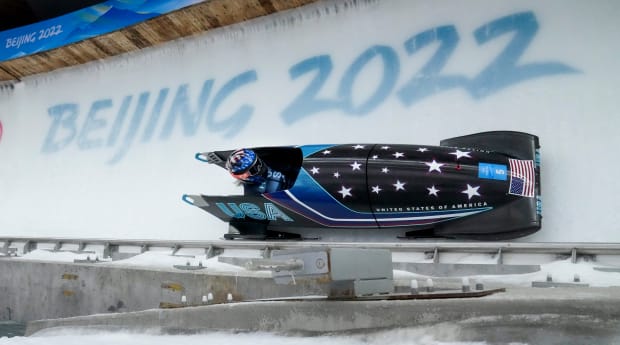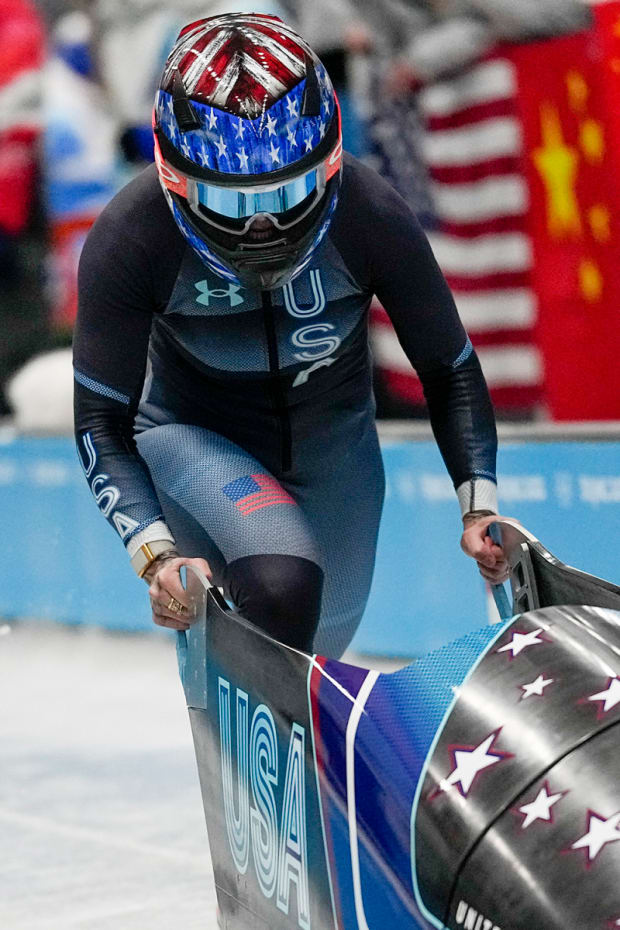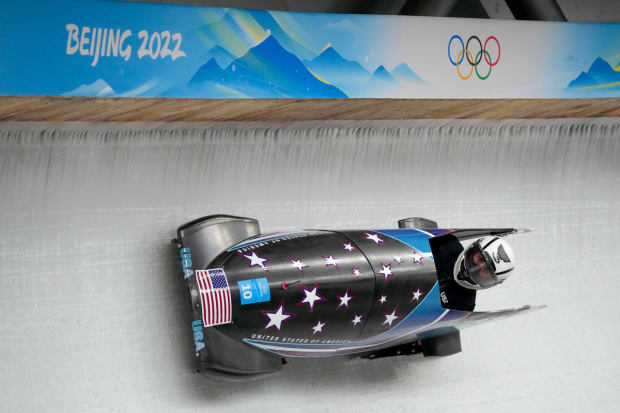BEIJING — In early 1940, a 24-year-old bobsled driver named Katharin Dewey piloted three men to unprecedented victory at the AAU national championships in Lake Placid, N.Y., shattering a once-impenetrable icy ceiling. “Bobsledding, since its inception a stronghold of male sport, bowed … to femininity,” the Associated Press wrote at the time. But the thrill proved short-lived. As the Saturday Evening Post reported later that decade, “This pill was too bitter for some of the lads to swallow. The next winter Katharine was barred from racing.”
A half-century-plus passed before more meaningful progress arrived: Not until the 2002 Winter Olympics in Salt Lake City did the IOC finally allow two-woman bobsleigh into its program, despite both four- and two-man versions appearing in every Games at which sliding events were held since the Great Depression. Sexist arguments predictably fueled this exclusion, chiefly the belief that women faced greater risk of injury than their male counterparts.
“There’s always going to be people who says it’s too dangerous,” Canadian bobsledder Cynthia Appiah, 31, says today, “and funny enough it’s never the women saying that.”

Mark Schiefelbein/AP
Which brings us to Sunday afternoon at the snow-dusted National Sliding Centre in Yanqing, where two pioneers came screaming down the track in their first two runs of competition, representing not just the United States but an entire generation of fearless female bobsledders. For years Kaillie Humphries and Elana Meyers Taylor have steered the fight for equality, preaching the importance of representation at every hair-raising turn. And now the fruits of their labor have been realized, with monobob—aka solo bobsled—making its debut on the Olympic stage.
“We have this inner battle that goes on, but at the end of the day we both want the same thing, which is great participation for women within sport,” said Humphries, a three-time medalist (gold in 2010 and ’14; bronze in ‘18) in two-woman bobsled. “When both of us are willing to put ourselves on the line like that, it will help raise the game for everybody, which is important.”
Given what Humphries and Meyers Taylor have each been through as individuals, they would be plenty forgiven if they had punted on the big picture and chosen to focus on themselves. Start with Humphries, who enters Monday’s final heats with a huge 1.04-second lead over the rest of the field. It was less than four years ago that the Calgary native, then representing her birth country, told Bobsleigh Canada Skeleton and the Canadian Olympic Committee that she was being emotionally and mentally harassed by her coach, Todd Hays. An internal investigation came up empty. A subsequent appeal hasn’t gone much of anywhere. So she sought refuge with Team USA, barely receiving citizenship in time to make the roster of Beijing.
“I want to be able to represent the stars and stripes to the best of my ability, and give back to a country that has adopted me and given me a longer career and a safe place in order to compete,” Humphries said. “I’m very honored to be here, especially because nothing was guaranteed, and I’m very honored that the USA has backed me the way that is has.”

Pavel Golovkin/AP
Also a three-time medalist (silvers in 2014 and ’18; bronze in ’10) in two-woman bobsled, Meyers Taylor, meanwhile, tested positive for COVID-19 soon after arriving in China, as did her husband Nic Taylor, her 2-year-old son Nico and her father Eddie Meyers. (Nic is an alternate for the U.S. men’s bobsled team, and Eddie made the trip to help take care of Nico, who was born prematurely and has Down syndrome.) Forced into isolation apart from her family, Meyers Taylor recalls “bawl[ing] my eyes out” throughout her five days behind a locked hotel door.
"It’s been extremely difficult,” she said. “It’s been so much mental low and mental stress, it's been hard to even focus on bobsled. … But at the end of the day, the way I look at it, it’s just a blessing to be out here, because it wasn’t a given. There’s people [here] who’ve suffered from COVID for a long time and not able to clear protocols—let alone the rest of the world. It is definitely a different Games, and definitely way different than I imagined it.”

Mark Schiefelbein/AP
Yet they continue to choose to lead, not only in the standings—Meyers Taylor currently sits in fourth, a tenth of a second off the podium behind Germany’s Laura Nolte—but in their sport. It’s not that the work is anywhere close to finished. Despite the addition of monobob, male bobsledders (124) still outnumber the women (46) here by nearly three-to-one, as a number of monobob pilots are also entered into the two-woman competition. And four-woman bobsled will have to wait until 2030 at the earliest, with the events already set for Milano-Cortina 2026.
But the impact that these queens of sliding have already made has not gone unnoticed by their peers. “I’m so proud and honored to be amongst these strong, powerful, courageous women,” says Jamaica’s Jazmine Fenlator-Victorian, a three-time Olympian who also raced for the U.S. in 2014 in Sochi, where she was Meyers Taylor’s roommate. “I hope our voices are continually heard. I hope we continue to raise voices and inspire the new generation to do the same.”
Adds Appiah, “You’re contending against a very old sport, where women’s bobsleigh is still in its infancy … So you’re dealing with a lot of old-school mentality, but you have to learn to brush that aside because that’s them and that's not you. You know what you can do, you know what you have to do to be successful and just keep on powering through.”
For her part, Humphries figures she will have more time to reflect on her legacy once the Games are over and she’s “on the plane” back home. As of now, though, she is focused on a singular goal: Speeding down the track as fast as she can to capture a third gold medal—and triumph in that internal battle with her fellow trailblazer to boot.
“Honestly it means the world,” Humphries says, “To know that we fought so hard for that greater opportunity and participation for women worldwide, and that the IOC and the IBSF and everybody listened and provided another opportunity for us to be able to advocate for something, and then be able to participate in is huge—let alone win.”







